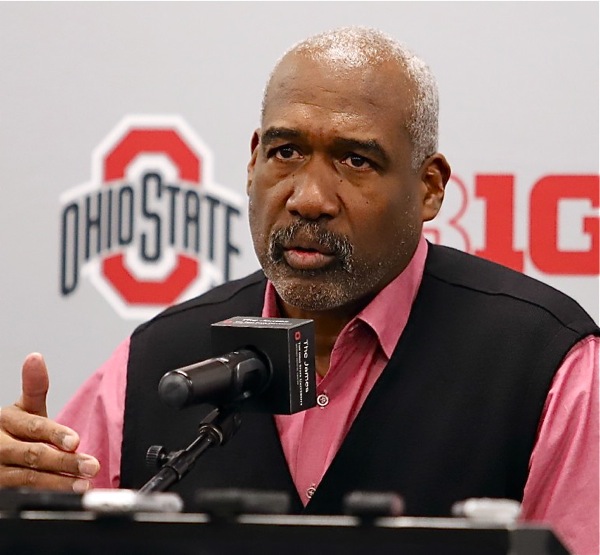With Texas and Oklahoma leaving the Big 12 for the SEC, every member of the Big Ten should be nervous about the future under the leadership of Commissioner Kevin Warren. That includes Ohio State, which may be motivated to react in a way that previously would have seemed unthinkable.
 There are myriad more unknowns than certainties amid the speculation that’s followed the stunning departure of Texas and Oklahoma from the Big 12 to the SEC, but one unimpeachable reality stands clearly on the horizon:
There are myriad more unknowns than certainties amid the speculation that’s followed the stunning departure of Texas and Oklahoma from the Big 12 to the SEC, but one unimpeachable reality stands clearly on the horizon:
Ohio State is not enamored with the leadership of Kevin Warren as Big Ten commissioner.
That’s alarming for the future of the league Warren leads, or, better said, the league Warren is paid handsomely to lead but has epically failed to steward.
If you doubt Ohio State’s displeasure, consider athletic director Gene Smith’s on-the-record comment to WSYX’s Clay Hall last week at the Big Ten’s annual football media days.
Unprompted, Smith seemed to take pleasure noting that Warren was not on the list of nine candidates the Big Ten Advisory Commission initially recommended for league presidents to vett as the successor to Jim Delany.

Big Ten commissioner Kevin Warren’s latest comments show a glaring lack of self-awareness about his failures.
This was not a revelation, having been previously reported at the time, but Smith making special effort to mention it carried an unmistakable message:
Don’t blame me. I didn’t hire this guy.
Smith is no newbie in the turbulent tides of big-time collegiate sports politics. He is, instead, an expert swimmer in those waters.
He has chaired or been a member of every powerful NCAA committee and boasts a list of corporate and business accolades longer than a line drawn around Ohio Stadium.
Smith is the ultimate survivor, not just of the suspension he curiously received from OSU in the Urban Meyer-Zach Smith matter, but of the 2010 scandal that ultimately chased both Gordon Gee and Jim Tressel from their lofty perches as Ohio State president and head coach, respectively.
Smith clearly knows how to weigh his words carefully and employ them purposefully.
He wanted it known that Warren did not have his endorsement as Big Ten commissioner in June of 2019. And the only reason to say that was to underscore Smith’s — which is to say, Ohio State’s — clear displeasure with Warren now.
What that means for Ohio State is a mystery, but it now knows the danger of adopting the same view of Big Ten membership under Warren’s direction that it held under Delany’s.
OSU was loath to flex its muscle as the league’s most powerful entity over the past two decades because of what Smith has termed “a rising tide raises all boats” mindset.
“We’re different than a lot of leagues,” he told the Ann Arbor News a month before Warren’s hiring. “We’re collaborative; we’re collegial; we work together; we make sacrifices for one another. … So, at the end of the day, we do what’s best for the league and that takes sacrifice.”
But if the last year has demonstrated anything, it’s that the good ship Big Ten has a Warren-sized hole in the hull and the bilge pump may be inadequate.
You’ll note that right about the time Texas’ and Oklahoma’s departure for the SEC came to light, the Big Ten added long-time Wisconsin football coach and former athletic director Barry Alvarez as a liaison between the league and its football coaches.
Delany, a former basketball player under Dean Smith at North Carolina, somehow managed to communicate with his football coaches just fine over 30 years as Big Ten commissioner without such an assistant.
But Warren, with more than 20 years experience in the front office of three NFL franchises before coming to the Big Ten, developed such a need entering just his third year.
Can anyone explain that?
Well, nothing illuminates Warren’s deficiencies and thus denigrates the Big Ten’s brand more than the fact — openly acknowledged by everyone in the conference — that he had no inkling Texas and Oklahoma were looking to leave the Big 12 or that they failed to so much as call Warren to investigate the merits of joining the Big Ten.
Seismic decisions such as leaving the Big 12 — where UT and Oklahoma are the cornerstones and thus hold all the power — show how much those schools believe in the SEC’s future versus the present where they are…and whatever the Big Ten’s future is under Warren’s direction.
Warren’s colossal mismanagement of the 2020 football season amid COVID challenges could birth a curriculum for a graduate school course in Feckless Leadership 101.
On July 9, Warren blind-sided his fellow commissioners of the Big 12, SEC, ACC or Pac 12 about his plans to play a conference-only schedule that fall, saying nothing to them on a conference call just days before making the announcement.
On Aug. 5, the Big Ten unveiled its 10-game, conference-only schedule, only to cancel the season six days later, a decision Warren said at the time, “will not be revisited.”
Warren thought his bold first move would force every other conference to follow suit, but instead only the Pac 12 did so. The SEC, Big 12 and ACC held out and maintained plans to play a full schedule.
Nebraska immediately threatened to play an independent full season. Ohio State and Michigan both departed from Big Ten protocol and openly questioned the timing of the decision, with Smith going so far as to directly contradict Warren’s statement by calling the cancellation, “a temporary delay.”

Warren did not have Gene Smith or the Big Ten Advisory Committee’s recommendation as Big Ten commissioner in June of 2019.
Parents of players who had quarantined for months were irate at the lack of communication from Big Ten headquarters and protests ensued.
Next, then-President Donald Trump got involved by pressuring Warren to get his teams back on the field. That, of course, was a transparent bit of political gamesmanship to curry favor in swing states, but also a knife between Warren’s shoulder blades for prioritizing an equally-transparent get-out-the-vote effort on Big Ten campuses clearly aimed at ousting Trump from office.
The Big Ten eventually caved to external pressure and hastily put together a season in October, one marred by repeated cancellations of an abbreviated eight-game schedule.
And in one final act of embarrassment, the league established a six-game minimum to play for the conference title, then rescinded that upon the cancellation of the Ohio State-Michigan game for the first time since 1917, leaving OSU one game shy of the qualifying standard.
All of that dysfunction pales in comparison to Texas and Oklahoma bolting for the SEC without Warren’s awareness or either school’s interest Big Ten membership on his watch.
With all that as the backdrop, Warren stepped to the podium last week and said, “I don’t have any regrets. If I had the chance to do it all over last year, I would make the same decisions that we made.”
Sadly, no amount of humiliation guarantees the slightest vestige of humility.
Bruce Hooley is a former sports editor of the Troy Daily News and has covered Ohio State and the Big Ten for 25 years at the Cleveland Plain Dealer, ESPN and Fox Sports Radio affiliates and staging.pressprosmagazine.com He also hosts the We Tackle Life podcast on iTunes and GooglePlay.



